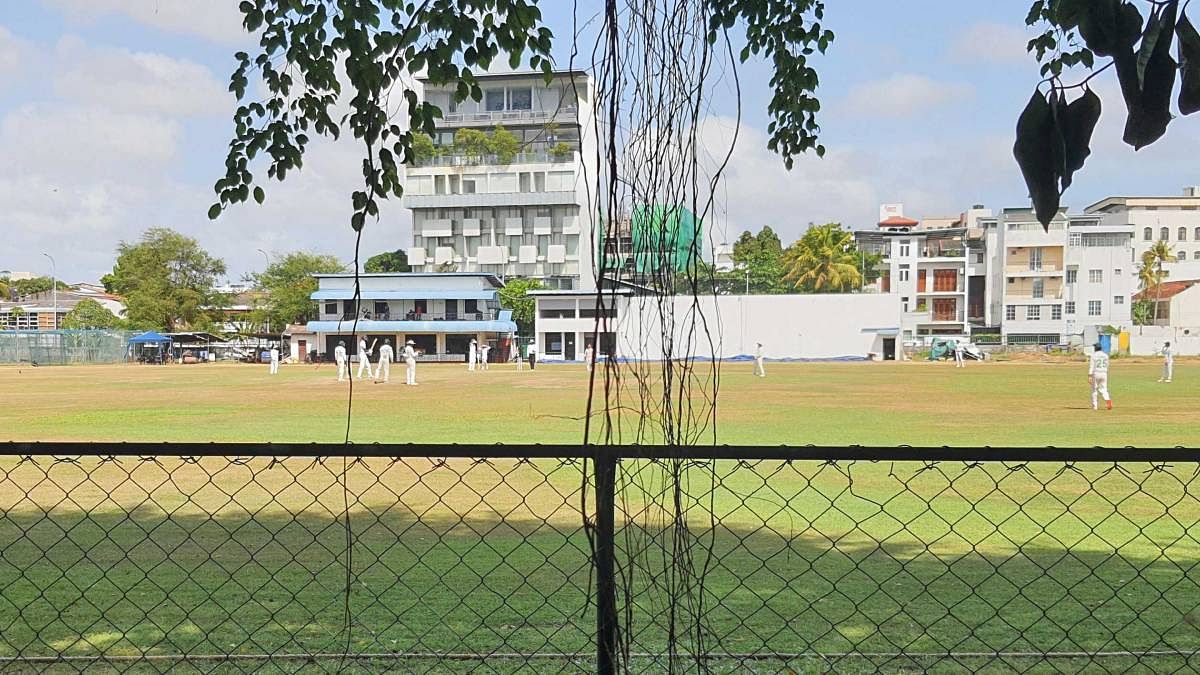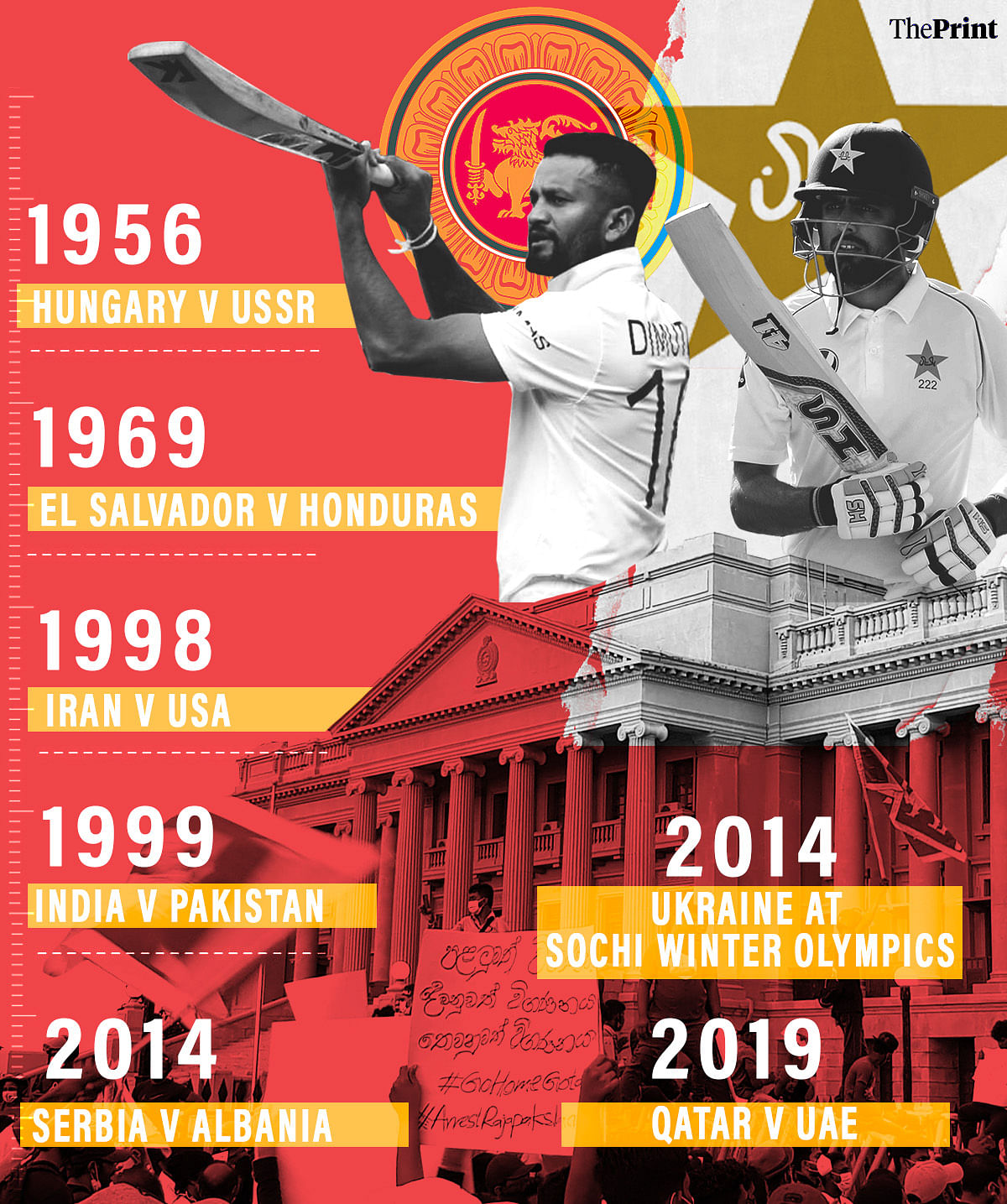New Delhi/Colombo: On Wednesday morning, as President Gotabaya Rajapaksa high-tailed it out of Sri Lanka, Nishan Madushka stood his ground. He was ready to face express pace and left-arm spin for a third day at the historic Colts Cricket Club ground in Colombo — just 8 km from the presidential palace that thousands of angry protesters stormed earlier this week.
Madushka is part of the Sri Lanka A team that met visitors Pakistan in a three-day practice match starting Monday. This faceoff is a prelude to a bigger cricketing battle, when the full strength of the Sri Lankan team — fresh from a 1-1 draw in a two-match Test series against Australia — will meet Pakistan in a two-match World Test Championship series that starts Saturday, with the second Test scheduled to end on 28 July.
Unlike the games against Australia, however, the Pakistan match is being played under tight security from the Sri Lankan Army and police. Particularly since the second Test against Australia saw hundreds climb Galle Fort’s ramparts Saturday to protest against the government — and celebrate left-arm spinner Prabath Jayasuriya’s debut demolition job of Pat Cummins’ Australian side.
Watched many Sanga-Mahela stands, Rangana Herath routs, a Dale Steyn spectacular, and a Chris Gayle triple-hundred at Galle, my favourite cricket venue of all.
I've had 24 hours to think about it now, and I'm sure. Yesterday was the best day I ever had there. pic.twitter.com/i6bsHkQnLt
— Andrew Fidel Fernando (@afidelf) July 10, 2022
An official at the Colts club said only those people on a list approved by the Sri Lankan cricket board were allowed for the match. ThePrint saw a local resident turn back after he was stopped from entering the stadium because he wasn’t a member of the club.

The match ended in a draw Wednesday. After Pakistan scored 323 in their first innings, Sri Lanka A responded with a declaration at 375 for 8. Pakistan then went in to bat a second time, scoring 178 for 2 at the close of play.
Sri Lanka have yet to name their squad for the Pakistan matches but will likely retain the side that drew 1-1 with Australia, especially since the first Test will also take place in Galle, where spinners thrive. So far, both Sri Lanka and Pakistan have scored a similar number of percentage points as they compete for a spot in next year’s World Test Championship final.
Also Read: Carrom at PM house, swimming in President residence — Lull after storm in Sri Lanka
Going back a long way
The cricketing ties between the two countries are far closer than many other competitors in the game.
Sri Lanka was the last cricketing nation to tour Pakistan in 2009 when militants attacked the touring party in Lahore, triggering a six-year international exile for the hosts’ venues. In 2017, Sri Lanka became the second cricket country (after Zimbabwe) to visit Pakistan again, and played a significant role in the re-normalisation of matches in the country.
Off the field, the two South Asian powers now find themselves in similar financial boats, relying on critical negotiations with the International Monetary Fund in order to find viable routes out of ongoing economic crises.
Politically significant sporting encounters

Given the political, economic and societal upheavals looming over this Test series, the situation harkens back to other sporting encounters in years past, when tensions off the field were, for a brief moment, superseded by what happened on the field.
Hungary vs. USSR (1956)
The 1956 Olympics saw the iconic ‘Blood in the Water’ water polo semi-final match between Hungary and the Soviet Union , when the central European nation took down the giants 4-0 on 6 December — a month after the student-led Hungarian Revolution, a popular uprising against the Soviet-backed Communist government in Hungary. The bloody political animosity between the two countries played itself out on the field as well as off it — as Soviet tanks pushed into Budapest to put a crushing end to the uprising, the water polo match itself saw Hungarian player Ervin Zador’s face covered in blood after being punched by Soviet player Valentin Prokopov.
El Salvador vs. Honduras (1969)
Even though the armed conflict between these two central American nations lasted less than a week in July 1969, the match between Honduras and El Salvador was widely known as the “football war” as it was preceded by a bitterly contested three-match qualifier series for the 1970 FIFA World Cup. After the first two matches were marred by riots and fan violence, El Salvador severed ties with Honduras citing alleged Honduran oppression of Salvadorans living there. El Salvador won the third match in extra time.
Iran vs. USA (1998)
Decades after the 1953 US-led coup that ousted Mohammad Mosaddegh and the 1979 revolution that saw the overthrow of the US-backed Shah Mohammad Reza Pahlavi and the rise to power of Ayatollah Khomeini, Iran’s encounter with the United States at the 1998 FIFA World Cup is considered “the most politically charged match in World Cup history”. Contrary to expectations, however, Iranians were seen giving white roses to their American rivals and taking photos together before they won the game 2-1.
India vs. Pakistan (1999)
India’s controversial sporting history with Pakistan is well-documented, but the most notable encounter on the cricket field took place in 1999 — months before the war in Kargil.
Pakistan toured India for two Tests that year, winning the first in a dramatic fashion at Chennai’s Chepauk stadium and embarking on a victory lap around the stadium to rousing applause from Indian fans. India won the second Test in Delhi in an encounter that saw Anil Kumble take all 10 wickets in the final innings.
Ukraine at Sochi Winter Olympics (2014)
Ukraine’s participation in the 2014 Winter Olympics at Russia’s resort town of Sochi was one of the last major tournaments held on either Ukrainian or Russian soil that saw the two countries directly compete against each other. The Sochi Olympics were held in February 2014 — three months after the violent Euromaidan revolution and amid Russia’s invasion of Crimea. The eight-year war in Donbas followed this, and sporting federations in both countries decided to keep their players from playing each other again.
Serbia vs. Albania (2014)
Tensions between the two countries that had initially led to the Kosovo War — an armed conflict in Kosovo in southeastern Europe that started on 28 February 1998 and lasted until 11 June 1999 — came to the fore again during a qualifying game for UEFA Euro 2016 that was held in Belgrade in October 2014. Serbian fans in the stadium chanted slurs against their Albanian opponents at the start of the match before a drone carrying the nationalist “Greater Albania” flag fell onto the pitch mid-match, leading to an on-field quarrel between the players. The match was abandoned after 42 minutes of play, and UEFA controversially awarded Albania a 3-0 win after conducting an investigation.
Qatar vs. UAE (2019)
This Asian Football Confederation Asian Cup semifinal match in Abu Dhabi was contemporaneously called the “Blockade Derby” in light of the UAE and fellow Asian Cup competitors Saudi Arabia breaking off diplomatic ties with Qatar in June 2017 and blocking the latter’s land, air and sea trading routes. But on the field, it was Qatar who had the last laugh, thrashing hosts UAE 4-0 and going on to win the Asian Cup for the first time in their footballing history.
(Edited by Uttara Ramaswamy)
Also Read: Lanka’s Gotabaya ‘flees’ to Male, likely to head to Dubai or Singapore later



